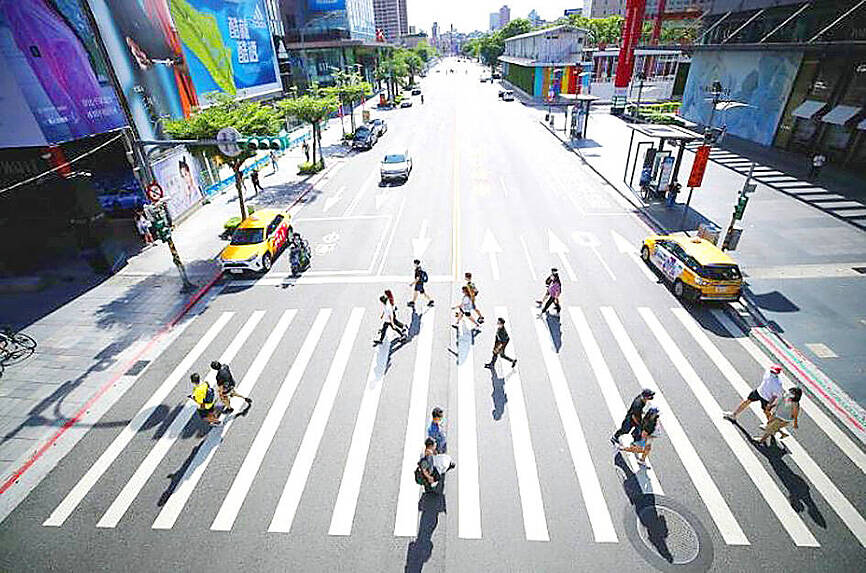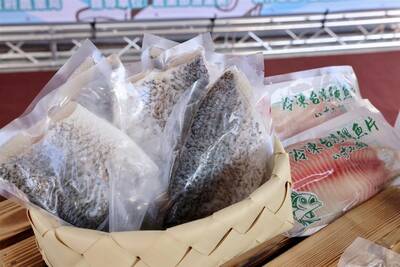The government aims to better protect pedestrians by expanding the distance between pedestrian crossings and vehicle stop lines, Ministry of Transportation and Communications officials said.
The revision to the Regulations on Establishing Traffic Signs and Indicating Lines (道路交通標誌標線號誌設置規則) was proposed after Minister of Transportation and Communications Chen Shih-kai (陳世凱) told lawmakers it would be a national shame if pedestrians were hit by motor vehicles while walking on pedestrian crossings.
The revision would widen the gap between crossings and vehicle stop lines from the current width of 1m to 3m, to 2m to 3m.

Photo: CNA
Ministry officials said they aim to complete the revision of the regulations in June and begin inspecting local governments’ compliance by the third quarter.
A ministry survey found that pedestrian crossings and vehicle stop lines at most localities are separated by at least 1m, but some are less than 1m apart.
If vehicle stop lines are too close to pedestrian crossings, pedestrians would feel pressured when crossing the streets, while drivers of trucks or other large vehicles might not see pedestrians crossing in their blind spots, the ministry said.
Studies from the Institute of Transportation, the ministry’s think tank, showed that the distance between pedestrian crossings and vehicle stop lines is 1m to 3m in Japan, 2m in Sweden, 2m to 3m in South Korea, 3m in Singapore and the UK, while the US has a minimum of 1.2m.
Highways and Road Safety Deputy Director-General Huang Yun-kui (黃運貴) said that all local governments must follow the revised regulations once implementation starts.
Every locality would be asked to identify intersections where pedestrian crossings and vehicle stop lines are less than 1m apart and submit plans to address them before the end of this year, he said.
Aside from random inspections conducted by the ministry, people can also report localities that do not follow revised regulations, he added.

Taiwan's Vice President Hsiao Bi-khim (蕭美琴) said Saturday that she would not be intimidated by the Chinese Communist Party (CCP), following reports that Chinese agents planned to ram her car during a visit to the Czech Republic last year. "I had a great visit to Prague & thank the Czech authorities for their hospitality & ensuring my safety," Hsiao said on social media platform X. "The CCP's unlawful activities will NOT intimidate me from voicing Taiwan's interests in the international community," she wrote. Hsiao visited the Czech Republic on March 18 last year as vice president-elect and met with Czech Senate leadership, including

There have been clear signs of Chinese Communist Party (CCP) attempts to interfere in the nationwide recall vote on July 26 in support of Chinese Nationalist Party (KMT) legislators facing recall, an unnamed government official said, warning about possible further actions. The CCP is actively involved in Taiwanese politics, and interference in the recall vote is to be expected, with multiple Chinese state media and TAO attempts to discredit the Democratic Progressive Party (DPP) and undermine public support of their recall movement, the official said. This interference includes a smear campaign initiated this month by a pro-Beijing Hong Kong news outlet against

A week-long exhibition on modern Tibetan history and the Dalai Lama’s global advocacy opened yesterday in Taipei, featuring quotes and artworks highlighting human rights and China’s ongoing repression of Tibetans, Hong Kongers and Uighurs. The exhibition, the first organized by the Human Rights Network for Tibet and Taiwan (HRNTT), is titled “From the Snowy Ridges to the Ocean of Wisdom.” “It would be impossible for Tibetans inside Tibet to hold an exhibition like this — we can do it. because we live in a free and democratic country,” HRNTT secretary-general Tashi Tsering said. Tashi Tsering, a Taiwan-based Tibetan who has never

A first shipment of five tons of Taiwan tilapia was sent from Tainan to Singapore on Wednesday, following an order valued at NT$600,000 (US$20,500) placed with a company in the city. The products, including frozen whole fish and pre- cooked fish belly, were dispatched from Jiangjun Fishing Harbor, where a new aquatic processing and logistics center is under construction. At the launch, Tainan Mayor Huang Wei-che (黃偉哲) called the move a “breakthrough,” marking Taiwan’s expansion into the Singaporean tilapia market. Taiwan’s tilapia exports have traditionally focused on the United States, Canada, and the Middle East, Huang said, adding that the new foothold in